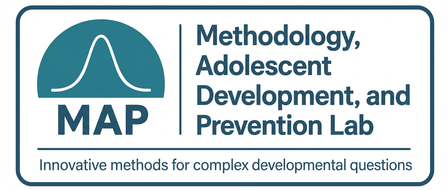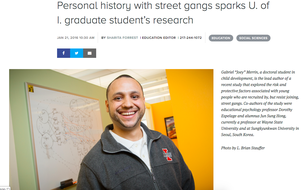Gabriel J. Merrin
Assistant Professor
Syracuse University - Department of Human Development and Family Science
Biography
Dr. Gabriel “Joey” Merrin is an Assistant Professor in the Department of Human Development and Family Science at Syracuse University, where he directs the Methodology, Adolescent Development, and Prevention (MAP) Lab. As a prevention scientist and applied developmental methodologist, Dr. Merrin’s research program advances scholarly understanding of how risk and protective processes interact to shape adolescent development and the transition to young adulthood. His work emphasizes the promotion of resilience and equity through rigorous quantitative methods translated into evidence-based prevention strategies that enhance outcomes for diverse youth and families.
Research Program
Dr. Merrin’s program of research systematically examines how individual, peer, family, school, and community contexts interact dynamically to influence developmental pathways related to harassment, victimization, mental health, and risk behaviors including substance use and aggression. His scholarship elucidates not only risk factors but also protective mechanisms that foster resilience and promote positive developmental trajectories.
His research comprises three interconnected lines of scholarly inquiry:
School-Based Prevention and Identity-Based Harassment – Investigating how school environments and peer ecologies shape adolescent developmental outcomes, with particular emphasis on bullying and bias-based harassment. This work employs longitudinal analytical models, social network methods, and rigorous randomized controlled trial designs to evaluate the effectiveness of school-based prevention programs including Second Step, WITS Programs, Boston vs. Bullies, and Sources of Strength. Recent work focuses on understanding the root causes and consequences of bias-based harassment across multiple levels of the social ecology.
Substance Use Trajectories and Developmental Transitions – Examining longitudinal patterns of adolescent and young adult polysubstance use and associated developmental transitions. Utilizing advanced person-centered analytic approaches including latent class analysis, growth mixture modeling, and latent transition analysis, this work elucidates how shifting social roles and contexts (e.g., educational transitions, employment, romantic relationships) contribute to both risk escalation and resilience during critical developmental periods.
Adverse Childhood Experiences and Psychosocial Development – Synthesizing two decades of empirical research and conducting novel longitudinal investigations to understand how distinct adverse childhood experiences differentially shape peer relationships, mental health, and resilience. This work challenges traditional cumulative ACE scoring models by examining specific ACE profiles and their unique developmental consequences, thereby informing more nuanced trauma-informed and prevention-oriented practices.
Methodological Innovation and Open Science Contributions
Dr. Merrin has spearheaded the development of CATAcode, an innovative R package that addresses critical methodological gaps in measuring and analyzing identity categories within social science research. Published on CRAN and featured in Advances in Methods and Practices in Psychological Science, this computational tool provides principled, transparent methods for coding Check-All-That-Apply demographic items. CATAcode makes substantial contributions to measurement transparency, research generalizability, and analytical reproducibility across diverse research contexts. The package includes comprehensive technical documentation and a detailed methodological vignette demonstrating applications across varied substantive domains.
Scholarly Recognition
2025-2027 National Institutes of Health Loan Repayment Program Award
Syracuse University 2024 Falk College Faculty of the Year Award for Excellence in Research
Syracuse University 2024 Excellence in Graduate Education Faculty Award
Texas Tech University 2021-2022 Alumni Association New Faculty Award
Laboratory Leadership and Mentorship
Dr. Merrin directs the Methodology, Adolescent Development, and Prevention (MAP) Lab, which is dedicated to translating rigorous developmental science into actionable, evidence-based prevention and intervention strategies. The lab emphasizes collaborative scholarship and has successfully produced 13 student-led peer-reviewed publications, providing comprehensive mentorship opportunities that support both undergraduate and graduate student scholarly development.
Collectively, these scholarly efforts position Dr. Merrin’s work at the critical intersection of developmental science, prevention science, and methodological innovation—advancing theoretical knowledge while simultaneously translating empirical findings into meaningful, practical strategies that foster healthy development across diverse youth populations.
As an applied scholar deeply committed to community impact, Dr. Merrin collaborates actively with schools and community organizations serving vulnerable youth populations, including serving on the board of directors at Elmcrest Children’s Center. His integrated research program addresses four fundamental scientific questions: (1) What longitudinal processes influence healthy adolescent development? (2) When and for whom do these developmental processes operate differently? (3) How do individual and contextual processes interact dynamically over time? (4) How can empirical findings be effectively translated into prevention and intervention efforts that promote positive youth outcomes?
Interests
- Prevention science and school-based program evaluation
- Healthy adolescent development in the transition to young adulthood
- Identity-based harassment, bullying, and psychosocial outcomes
- Adolescent risk, resilience, and developmental trajectories
- Longitudinal quantitative methods and R programming
Education
-
Ph.D. in Educational Psychology, 2017
University of Illinois Urbana-Champaign
-
Ed.M. in Human Resource Development, 2010
University of Illinois Urbana-Champaign
-
B.A. in Sociology, 2009
University of Illinois Urbana-Champaign



